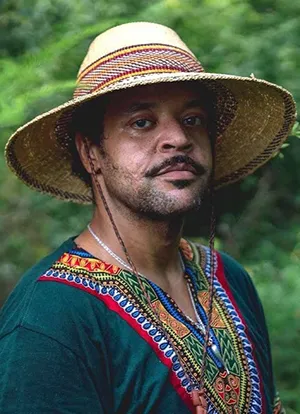‘A Horizon of Possibility for the African Diasporic Renewal’: James Padilioni Embarks on American Council of Learned Societies Fellowship

For James Padilioni, Florida is much more than sunshine and “Florida Man” headlines.
“I look forward to telling a different story,” he says, “one in which Florida isn’t a punchline, and one that isn’t foreclosed by white nationalism, but instead forms a horizon of possibility for the African Diasporic renewal.”
Padilioni will explore that next year through his highly sought-after fellowship with the American Council of Learned Societies (ACLS). The award, bestowed upon no more than 60 scholars in the U.S. each year, recognizes outstanding scholarship in the humanities and interpretive social sciences.
Primarily, Padilioni expects to finish his book, To Ask Infinity Some Questions: San Martín de Porres and the Black Hagiographic Mysteries of Florida, under advance contract with Fordham University Press and its Catholic Practice in the Americas series. Across several case studies, this project focuses on the figure of Saint Martín de Porres (1579-1639), an Afro-Peruvian friar canonized by the Vatican as the first Black saint born in the Americas.
Padilioni, a visiting assistant professor of religion and environmental studies, recently sat down to discuss his reaction to the fellowship news, what most excites him about the opportunity, and how his efforts connect to the classroom.
How did the ACLS award come about?
It’s been on my radar for several years. In my first year on faculty at Swarthmore (2018-2019), I began working with the folks in the Office of Sponsored Programs to help brainstorm my book project and find external sources of funding. This was especially helpful for my interdisciplinary project, which sits at the intersections of overlapping fields: religious studies, Catholic studies, Black studies, and geography of African Diaspora studies. For five years, I consistently applied to, and was rejected from, fellowships and research grants. When I received word of this ACLS selection, I was equally elated, surprised, and affirmed in my scholarship as a junior member of Swarthmore's faculty.
How would you describe To Ask Infinity Some Questions?
The book title is a quotation from author Zora Neale Hurston, a Black anthropologist and folklorist from Florida. She theorized that Florida was a "lush glade" for emergent forms of African Diasporic folklore. The book explores 20th- and 21st-century ritual and popular culture performances portraying the story of San Martín as observed among a distinct, but overlapping, patchwork of African American, Cuban, Bahamian, Haitian, Dominican, and Puerto Rican communities of South Florida's African Diaspora. I contend that such communities of devotion approach Martín de Porres as not only a Catholic saint, but as an elevated ancestor who empowers his spiritual descendants in their everyday pursuits … ‘to ask infinity some questions’ about the sublime and mysterious nature of life in the African Diaspora.
I look forward to detailing the various ways Martín's devotees have harnessed his memory via ritual to create and sustain their communities, as it relates to the long history of the African Diaspora and the trans-Atlantic slave trade.
What else does your fellowship entail?
I plan to visit several archives to lay the groundwork for my hopeful-second book project, which will focus in part on psychedelic legacies within Caribbean healing traditions, and their ongoing relevance for emergent psychedelic therapy protocols. I am collaborating with scholars from the Johns Hopkins Center for Psychedelic and Consciousness Research and the Johns Hopkins History of Medicine Department to create a plant medicine studies working group called "The Body Vegetal." We hope to host our inaugural symposium in 2024.
How do your fellowship efforts relate to your role at Swarthmore?
The book project rounds out the research component of my pedagogical focus on Afro-Latinx and Afro-Caribbean ritual performance. From installing Día de los Muertos altars to participating in Philadelphia's Carnaval de Puebla, I have developed multisensory, hands-on curricular experiences of Caribbean ritual performance in my courses at Swarthmore. I’m excited to incorporate many of the critical understandings worked out via teaching to the theoretical framework and rhetoric I employ in my book.



